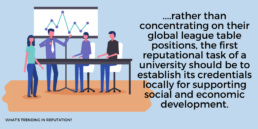In the last week, I have been fortunate enough to attend and speak at two conferences which have helped facilitate a truly global discussion about reputation in higher education.
The first of these was a meeting of the Worldwide Universities Network (WUN) hosted by The University of Lausanne in Switzerland. THE WUN, for those who don’t know, is a grouping of leading comprehensive institutions including six current and five former World 100 Network members. As part of the event, I spoke as part of a panel with Presidents and senior leaders focusing on the communications priorities for universities in the post-pandemic age.
The second was an event hosted by W100 member, University of Glasgow. The online conference was University of Glasgow’s global partners event to help launch their new international strategy, #GlobalGlasgow25, where I sat on a panel focusing on internationalisation and reputation.
Both events, despite being different in their delivery and purpose, generated discussions with shared themes which are at the heart of The World 100, and key to the future of higher education. These included:
Impact and Relevance
Universities need to focus strongly on demonstrating their impact on local, national and global communities.
The pandemic has shown, in many ways, the important role that universities can play in shaping society; but universities around the globe continue to face challenges in persuading comms stakeholders, particularly national governments, of their relevance.
Particular challenges were identified in countries where post-pandemic funding challenges are acute. The need to repair health systems and boost economic development puts further pressure on budgets for education and research.

Universities need to build the right relationships with governments, which many leaders reflected has become more challenging with an increasingly narrow view of the sector being applied by politicians.
More positively, many leaders are keen to exploit the opportunities for universities to build a reputation for relevance around contributions to the UN Sustainable Development Goals.
Global and Local Links
Linked to the theme of relevance, university leaders are identifying a particular challenge in navigating the demands of operating at the global level whilst maintaining a distinctive local profile.
International links clearly contribute to the intellectual strength of universities, but institutions also need to nurture their roots, and demonstrate that they are truly engaged with local communities.
One leader put forward the suggestion that, rather than concentrating on their global league table positions, the first reputational task of a university should be to establish its credentials locally for supporting social and economic development.

Co-operation trumps competition
Whilst no university leader would deny that they operate in an increasingly competitive environment, there is more to gain reputationally through a strong commitment to co-operation.
University partnerships and networks are increasingly important focuses as the challenges faced by institutions and wider society become more complex. Leaders see the benefits of collaboration extending to the reputation of their university; being seen as an institution that seeks fruitful engagement with other organisations is increasingly important.

And whilst online communication has offered the opportunity to open up global conversations more broadly than ever before, leaders really value the chance to meet face-to-face once again. Nothing beats the conversations over coffee, lunch or dinner – particularly with a view of a sparkling Lake Geneva in the background.
These and other themes in global reputation will be explored further at the World 100 Reputation Network Annual Conference in Montreal, 13-14 October.

